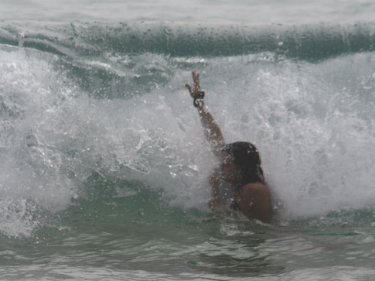Only a few sent representatives to a meeting with local officials and lifeguards this week.
And one of the resort representatives said they thought it was the responsibility of the booking agents to warn customers about the dangers - which is fine, if the resorts don't mind losing customers to other, safer destinations.
Somchai Sinlapanon, president of the Kata-Karon Hotels Association, dropped by at the meeting but stayed for only a few minutes.
More interested were the beach vendors who turned up to hear an expert view on what should happen next at the beach where 13 people have drowned since April last year, including three last month.
Australian water safety expert David Field, who has been coaching and training on Phuket for 10 years, said that Australia had a history of 104 years of lifesaving at beaches, so Phuket could not expect its culture to change overnight.
But he said that the lifeguards on the beaches this year were now genuine lifeguards. In past years, they could only be called beach boys.
''It's your beach,'' he told the gathering. ''If you want tourists to come, you must make sure it is a safe beach.''
During the monsoon season, Karon looked beautiful, but it was dangerous, he said. There were four types of deadly rip currents that occur - and Karon had two types, fixed and travelling rips, he said.
Two rips that were fixed and that were dangerous all year long could be found in the sea near Karon's central monument, and in the sea near the Karon roundabout, he said.
''These two spots are unsafe to swim all year long and need to be avoided by swimmers at all costs,'' Mr Field added.
Other rips moved along the beach, and it was the job of lifeguards and others on the beach to pinpoint them and make sure they could be avoided by swimmers, he said.
''The lifeguards are doing very well,'' he said. ''Within two years, the ones on Phuket will be the best lifeguards in all of South East Asia.''
He said a brochure prepared by the Phuket Provincial Administrative Organisation in six languages - english, russian, chinese, korean, japanese and german - would help enormously.
''But we need to educate visitors at every opportunity,'' he said.
An umbrella lounger vendor asked how she could help.
''Can you swim?'' asked Mr Field. ''No,'' she responded.
''You cannot swim but you can be a lifesaver if you learn the dangerous spots and warn people, and help to put out red flags. You can also blow a whistle when you see people going in.''
Mr Field said that lifeguards planned to hold courses for beach vendors that would enable them to learn cpr so they could be more active in helping.
The resorts, however, still appear reluctant - except for a few exemplary role-models - to accept that they have a duty to inform their guests on arrival that the beach can be deadly.
It was suggested that a major event should be held before every monsoon season to make sure everyone understood that saving lives was a community responsibility, and that everyone with a connection to the beach had a role to play.
The lifeguard's job is not easy. One lifeguard who risked his own life to drag a Russian man from the surf has not entered the water at Nai Thon since. It is to hoped that relocation to another beach will eventually help him recover his confidence.
Despite the best efforts of the lifeguard, the Russian man later died in an intensive care unit.





Simply make every resort, hotel guesthouse ETC have to post warning signs where their guest exit clearly warning them of the dangers of going into the ocean when the red flags are flying or the waves are up. Fine them if they don't post the signs. You could even require them to put signs in every room. Also require all public transportation to include TUK TUKs to post signs as well this will take care of one side of the problem that is lack of knowledge of the danger.
Posted by mike on August 7, 2011 15:20